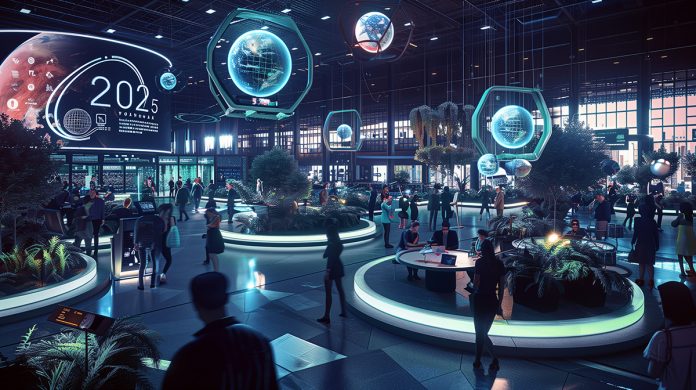The event and live marketing industry continues to navigate between rapid technological advancements and the growing demand for genuine live experiences. As we move into 2025, several key trends are set to dominate the industry, driven by the need for sustainability, technological innovation, and human connection.
1. Sustainability Takes Center Stage
Sustainability has become the new standard in event planning. Organizers must now meet both societal expectations and legal requirements such as the European Corporate Sustainability Reporting Directive (CSRD). The new ISO 20121:2024 standard links events more closely with the United Nations’ 17 Sustainable Development Goals (SDGs). To support this shift, VOK DAMS has developed the ‘SDG Event Compass,’ a tool designed to integrate sustainability into event strategies systematically. As emphasized in their white paper ‘Agile and Sustainable: Planning Events with the SDG Event Compass,’ sustainability must be at the heart of event planning, both strategically and operationally.
2. Agile Event Management for Enhanced Flexibility
Agile event management has emerged as an essential tool, combining flexibility, efficiency, and customer focus. This approach relies on iterative processes and continuous feedback, minimizing risks and tailoring events to the target audience. Agile planning also enables more resource-efficient implementation, reducing waste by using only necessary materials and services. The result is tailor-made experiences that are both efficient and sustainable.
3. Data-Driven Decision Making
Data-driven event management is revolutionizing the industry. Decisions are increasingly based on solid, data-backed insights rather than intuition. Data reveals participant preferences, optimizes visitor flows in real-time, and helps avoid overcapacity. During events, real-time analytics enable adjustments to guarantee an optimal experience. Post-event insights provide valuable data to make future events even more successful, allowing for the measurement, analysis, and improvement of participant satisfaction, ROI, and social media engagement.
4. Mindfulness-Focused Events
In a world of constant digital connectivity, mindfulness-focused events are gaining importance. These formats create analog retreats that focus on being present in the moment, fostering genuine interactions, enhancing well-being, and leaving a lasting impression. They reflect a shift toward mindfulness and mental health prioritization. For brands, they offer a unique opportunity to build emotional connections and differentiate themselves through impactful experiences.
5. The Metaverse: A New Frontier for Events
The metaverse continues to grow in importance, offering opportunities to create immersive and interactive event worlds. Hybrid events, seamlessly merging physical and digital worlds, are likely to become the norm. As technology advances, the metaverse will sustainably change how events are planned and experienced, connecting people regardless of location and opening up new creative possibilities.
6. Artificial Intelligence (AI) as a Gamechanger
AI has become indispensable in the event industry, optimizing processes, personalizing experiences, and analyzing data in real-time. From planning to execution and post-event analysis, AI ensures more efficient operations and impressive experiences. It’s not just a tool but a critical success factor for forward-looking events.
7. Standing Out in the ‘Age of Average’
The event industry faces a new challenge: while AI makes events more efficient, it can also make them more interchangeable. To stand out, brands must dare to be different with creative disruptions, bespoke formats, and authentic storytelling. Bold, innovative approaches will leave a lasting impression, making distinctiveness the key to success.
8. The Hamburger Model: Balancing Technology and Humanity
2025 will be defined by events that balance technology and humanity. The Hamburger Model illustrates this harmony, with humans providing the creative impulse (top bun), AI processing data and generating content (filling), and humans refining the output and adding authenticity (bottom bun). This balance delivers authentic and unforgettable experiences with a personal touch.
9. Live Events as an Antidote to the Digital World
As our lives become more digital, the desire for personal interaction grows stronger. Live events offer companies a unique opportunity to build trust and loyalty with customers, partners, and employees. The authenticity of live experiences creates an unparalleled foundation for lasting connections, especially in a time when AI-generated content raises questions about information authenticity.



